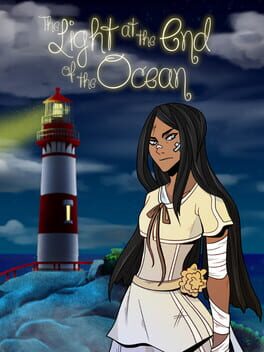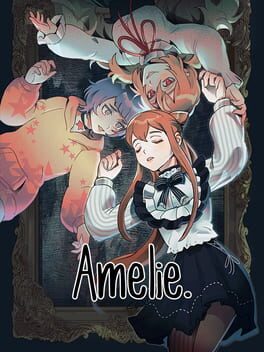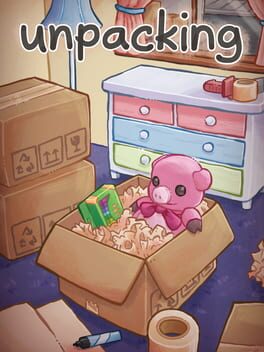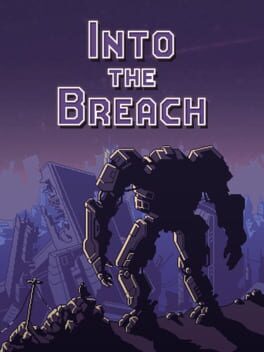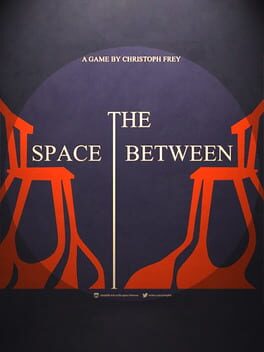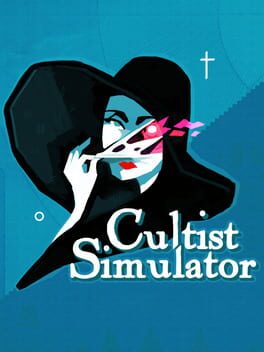StrayShellstone
Extremely solid writing, charming characters, gorgeous art, and a mystery that reveals itself at its own pace and has no intentions to deceive you of the true nature of this world. While it isn't breaking new ground, it certainly is perfecting it (small bug with the sun not properly disappearing beyond the horizon aside, which is the sort of thing you only comment on if basically nothing else is wrong with it).
Maybe I just have a soft spot for dealing with adversity and the quiet strength needed to go through day to day life, but when it works, it works.
Maybe I just have a soft spot for dealing with adversity and the quiet strength needed to go through day to day life, but when it works, it works.
2021
I wanted to like it, but tropes on tropes and repetitive story-telling for what is ultimately no thematic payoff feels difficult to recommend. There are parallels that are set up in ways that feel like they should almost work, but they just... don't? The story is very light on actual theme, which only leaves plot, and while it's common for visual novels to not actually have any meaningful choices, that somehow feels more insulting when the choices lead to different endings that are all as equally meaningless, all in service of a disconnect to a real plot.
but also it's gay, god bless
but also it's gay, god bless
2016
Well made, aesthetically brilliant, a good sense of humor, and you feel like a badass. I played this once on VR and the lack of an ability to crouch really limits the PC version, but this is still, without a doubt, the innovative shooter I've played in years, and as annoying as that meme is from a marketing perspective I genuinely believe it.
2019
Spectacularly designed puzzles oriented around shifting perspectives and excellent environmental humor make this game work well and all coalesce into a final message that works, and I left the game inspired, ready to handle new challenges to come. This alone makes the game worth playing.
I'm going to be much, much harsher in my review than the game deserves, and that's almost entirely a function of how close this game gets to perfect execution of its own concept. The overarching narrative and the conclusion all fit the core mechanics in a way that works and deserves to be experienced fresh. You should play it.
With that said, the core theme and excellent puzzles are undermined by a couple of things. First, the game has horror undertones, but doesn't really understand horror. So much of the game's conceit is that you've become trapped in your own dreams and are trying to escape the recesses of your own subconscious and of the world created by the therapist's clinic that ostensibly helps you navigate it, and the game even teases the idea of forcing you to confront your own demons and psychological issues at some point in the first act. It never happens, and the horror ends up being limited to creepy back alleyways, dark hallways, and fake bloody handprints, making the midsection aesthetically creepy without purpose. It makes the horror both seem toothless and incredibly threatening; I spent a lot of time worried that the game was going to throw jump scares at me just because "it'd be spoooky oooooo," which it fortunately never did.
Second, the game features two voiceover characters, one attempting to mimic the narrator of The Stanley Parable, the other attempting to mimic Portal's GLaDOS. Neither narrator lands with the wit of their inspirations, and Pierce's repeated and obnoxious reintroduction of his own name is not made more amusing by the AI character mocking him for it. I found it irritating, purposeless, and without narrative justification. It wasn't even close to enough to make me stop playing, but it really gave me the impression that the designers felt like it worked in other indie/puzzle games without really understanding how or why.
I'm going to be much, much harsher in my review than the game deserves, and that's almost entirely a function of how close this game gets to perfect execution of its own concept. The overarching narrative and the conclusion all fit the core mechanics in a way that works and deserves to be experienced fresh. You should play it.
With that said, the core theme and excellent puzzles are undermined by a couple of things. First, the game has horror undertones, but doesn't really understand horror. So much of the game's conceit is that you've become trapped in your own dreams and are trying to escape the recesses of your own subconscious and of the world created by the therapist's clinic that ostensibly helps you navigate it, and the game even teases the idea of forcing you to confront your own demons and psychological issues at some point in the first act. It never happens, and the horror ends up being limited to creepy back alleyways, dark hallways, and fake bloody handprints, making the midsection aesthetically creepy without purpose. It makes the horror both seem toothless and incredibly threatening; I spent a lot of time worried that the game was going to throw jump scares at me just because "it'd be spoooky oooooo," which it fortunately never did.
Second, the game features two voiceover characters, one attempting to mimic the narrator of The Stanley Parable, the other attempting to mimic Portal's GLaDOS. Neither narrator lands with the wit of their inspirations, and Pierce's repeated and obnoxious reintroduction of his own name is not made more amusing by the AI character mocking him for it. I found it irritating, purposeless, and without narrative justification. It wasn't even close to enough to make me stop playing, but it really gave me the impression that the designers felt like it worked in other indie/puzzle games without really understanding how or why.
2021
It's exactly what it's trying to be, nothing more, nothing less.
You slowly organize your things as you take them out of boxes, go through stages of your life, discover yourself, and reflect on the life you've lived. No pressure, no timers.
It's... kind. Peaceful. A chance to reflect, a kind of escapism, a moment of quiet.
I needed it.
You slowly organize your things as you take them out of boxes, go through stages of your life, discover yourself, and reflect on the life you've lived. No pressure, no timers.
It's... kind. Peaceful. A chance to reflect, a kind of escapism, a moment of quiet.
I needed it.
2020
You're a good person. I know you're a good person! A good person wouldn't do something like that...
Omori is a game about anxiety, guilt, and moving on from the past to face the real world, and I highly recommend it. Even if it's not the first of its kind to explore the subject matter, it is one of the most interesting executions I've seen of the genre. Charming art, middling but acceptable gameplay, and a pervasive sense of unease and horror set the tone for this very traditional turn-based strategy, with writing and worldbuilding that all work for a payoff that sticks with you.
The rest of this review is going to be spoilers, since it's hard to talk about the game outside of trite cliches otherwise. If you like psychological horror, play it.
---
Omori gets horror. It understands that horror is supposed to be used in service of a central plot, that the creepy-crawlies are supposed to actually represent something, and that the monster in the dark is almost always scarier when you don't fully understand what it is.
We follow Omori, a child who lives in what is very clearly a fantasy world of his own creation populated by friends from his childhood, exploring Headspace and going on adventures to eventually save Basil, his best friend. As the game progresses, elements from his past slowly start to inject themselves into the world at large in ways that fundamentally go against the central light-hearted and shallow tone of the world, often in ways that go completely unacknowledged by Omori's friends. Slowly, we learn the truth of Omori's past and exactly what Sunny is repressing.
Little details of the world are deliberate in how they lead us to the conclusion that something is wrong and that this world is a fantasy, from the very early reveal that the world is called Headspace to how Mari, Omori's sister, is constantly appearing in random locations in the world on her picnic blanket, to how the world does not acknowledge Omori's fears, to how the eventual diversions from the quest to save Basil get more and more disconnected from reality as cohesive worldbuilding starts to fall apart as they reach the limits of imagination.
In a lot of ways, the happy and lighthearted tone of the game itself serves to accent the horror; elements of horror go unacknowledged in increasingly blatant ways, making the juxtaposition of the something that haunts Omori poison the sanctity of the world he has created for himself. Suddenly, every happy moment becomes tense as you pretend that you aren't breaking apart at the seams in both your dream world and reality, and it turns a game that is only about 15% horror into something deeply tense. It's an extremely accurate way to simulate anxiety and forcing yourself to interact with the world despite it. This is, in my mind, the strongest part of the game, and this tension is reason alone to play it.
The central gimmick of the combat system is a rock-paper-scissors element of happiness, anger, and sadness, with each beating the next in turn. As both allies and enemies experience greater and greater peaks of emotion, they get stronger and stronger while also growing more vulnerable, with proper play involving the control of not just your emotions, but the emotions of enemies to properly optimize your skills. It helps to serve the underlying theme of how repression fundamentally cannot help solve our problems, and that our emotions and connections form our strongest assets, and while I love the concept, the execution of combat in the moment is occasionally tedious and lasts much longer than it feels like it should.
As time goes on, we slowly learn exactly what we are repressing, and the game takes on its second major theme of forgiveness and how we deserve to move on from guilt. It's revealed that Sunny, Omori's real life counterpart, killed Mari in what is implied to be an accidental shove down a flight of stairs and, with Basil's assistance, staged her body to fake her suicide. The thing that has been haunting Sunny this entire time is the twisted form of Mari's hanging corpse, and the game turns (at least in one route) to one where Sunny is forced to both confront the truth of what he did and learn to forgive himself and move past his guilt. This, also, is executed extremely well, and depending on what you do with this information, the game ends with you either succeeding or failing to forgive yourself for your crimes.
I've struggled with a version of this kind of guilt for most of my life. While the true ending finishes with Sunny defeating their inner demons and hoping that his friends will come to forgive him, the neutral ending finishes with Sunny haunted by the ghost of his past, following him into the future forever. The game is very earnest about believing that forgiveness is always possible, even if it leaves a scar, even if it means that some part of you (say, your right eye) will always be left behind, even if it means that things won't ever truly be the same.
It is this last part that, in my mind, is the weakest part of the game; I'm sure that many will come away with the message that Sunny can fully move on, as though his crimes will not live with him forever, as though some mistakes that haunt you can just be accepted. In many ways, the game is explicit about how we all can be forgiven, often without consequence; even if we did a bad thing, the game says, we aren't necessarily bad people.
Sometimes, I wished I believed that.
Omori is a game about anxiety, guilt, and moving on from the past to face the real world, and I highly recommend it. Even if it's not the first of its kind to explore the subject matter, it is one of the most interesting executions I've seen of the genre. Charming art, middling but acceptable gameplay, and a pervasive sense of unease and horror set the tone for this very traditional turn-based strategy, with writing and worldbuilding that all work for a payoff that sticks with you.
The rest of this review is going to be spoilers, since it's hard to talk about the game outside of trite cliches otherwise. If you like psychological horror, play it.
---
Omori gets horror. It understands that horror is supposed to be used in service of a central plot, that the creepy-crawlies are supposed to actually represent something, and that the monster in the dark is almost always scarier when you don't fully understand what it is.
We follow Omori, a child who lives in what is very clearly a fantasy world of his own creation populated by friends from his childhood, exploring Headspace and going on adventures to eventually save Basil, his best friend. As the game progresses, elements from his past slowly start to inject themselves into the world at large in ways that fundamentally go against the central light-hearted and shallow tone of the world, often in ways that go completely unacknowledged by Omori's friends. Slowly, we learn the truth of Omori's past and exactly what Sunny is repressing.
Little details of the world are deliberate in how they lead us to the conclusion that something is wrong and that this world is a fantasy, from the very early reveal that the world is called Headspace to how Mari, Omori's sister, is constantly appearing in random locations in the world on her picnic blanket, to how the world does not acknowledge Omori's fears, to how the eventual diversions from the quest to save Basil get more and more disconnected from reality as cohesive worldbuilding starts to fall apart as they reach the limits of imagination.
In a lot of ways, the happy and lighthearted tone of the game itself serves to accent the horror; elements of horror go unacknowledged in increasingly blatant ways, making the juxtaposition of the something that haunts Omori poison the sanctity of the world he has created for himself. Suddenly, every happy moment becomes tense as you pretend that you aren't breaking apart at the seams in both your dream world and reality, and it turns a game that is only about 15% horror into something deeply tense. It's an extremely accurate way to simulate anxiety and forcing yourself to interact with the world despite it. This is, in my mind, the strongest part of the game, and this tension is reason alone to play it.
The central gimmick of the combat system is a rock-paper-scissors element of happiness, anger, and sadness, with each beating the next in turn. As both allies and enemies experience greater and greater peaks of emotion, they get stronger and stronger while also growing more vulnerable, with proper play involving the control of not just your emotions, but the emotions of enemies to properly optimize your skills. It helps to serve the underlying theme of how repression fundamentally cannot help solve our problems, and that our emotions and connections form our strongest assets, and while I love the concept, the execution of combat in the moment is occasionally tedious and lasts much longer than it feels like it should.
As time goes on, we slowly learn exactly what we are repressing, and the game takes on its second major theme of forgiveness and how we deserve to move on from guilt. It's revealed that Sunny, Omori's real life counterpart, killed Mari in what is implied to be an accidental shove down a flight of stairs and, with Basil's assistance, staged her body to fake her suicide. The thing that has been haunting Sunny this entire time is the twisted form of Mari's hanging corpse, and the game turns (at least in one route) to one where Sunny is forced to both confront the truth of what he did and learn to forgive himself and move past his guilt. This, also, is executed extremely well, and depending on what you do with this information, the game ends with you either succeeding or failing to forgive yourself for your crimes.
I've struggled with a version of this kind of guilt for most of my life. While the true ending finishes with Sunny defeating their inner demons and hoping that his friends will come to forgive him, the neutral ending finishes with Sunny haunted by the ghost of his past, following him into the future forever. The game is very earnest about believing that forgiveness is always possible, even if it leaves a scar, even if it means that some part of you (say, your right eye) will always be left behind, even if it means that things won't ever truly be the same.
It is this last part that, in my mind, is the weakest part of the game; I'm sure that many will come away with the message that Sunny can fully move on, as though his crimes will not live with him forever, as though some mistakes that haunt you can just be accepted. In many ways, the game is explicit about how we all can be forgiven, often without consequence; even if we did a bad thing, the game says, we aren't necessarily bad people.
Sometimes, I wished I believed that.
2012
Thomas Was Alone's strongest point is its story and character with a brilliantly narrated script. It's a simple story told with a lot of heart. Gameplay mechanics help to emphasize each of the characters actions and motivations. By the end, I wanted to care about these characters. I wanted to see what the little rectangles would do.
The emphasis there is "wanted to care," because, frankly, I couldn't, as in the later sections of the game, every section of narration (the primary means of telling the story) is separated by repetitive, uninteresting, and incredibly unchallenging gameplay. Often, I'd race characters ahead, eager to skip to the next section of story, only to find that it would occasionally make the puzzle impossible and that I would, indeed, have to play some version of the Tower of Hanoi for several dozen iterations. Again. It completely shatters the pacing. I was struggling to keep playing through the game; the only thing that did keep me going was the charming narration. But at the end, it just... stops. The conclusion to the narrative isn't at all worth playing the game.
I'd say go for it if you really, reaaaally like puzzle games, regardless of difficulty, but apparently this one wasn't for me.
The emphasis there is "wanted to care," because, frankly, I couldn't, as in the later sections of the game, every section of narration (the primary means of telling the story) is separated by repetitive, uninteresting, and incredibly unchallenging gameplay. Often, I'd race characters ahead, eager to skip to the next section of story, only to find that it would occasionally make the puzzle impossible and that I would, indeed, have to play some version of the Tower of Hanoi for several dozen iterations. Again. It completely shatters the pacing. I was struggling to keep playing through the game; the only thing that did keep me going was the charming narration. But at the end, it just... stops. The conclusion to the narrative isn't at all worth playing the game.
I'd say go for it if you really, reaaaally like puzzle games, regardless of difficulty, but apparently this one wasn't for me.
2018
Mech. Chess.
With dozens of unique abilities and a heavy emphasis on unit manipulation, Into the Breach takes a comparatively stale turn-based tile strategy game and makes it an absolute hell, where every turn becomes about taking precise tools to strategically turn an overwhelming enemy swarm against itself. On the highest difficulties, every turn feels tense, every motion feels deliberate, every cost feels calculated. Every moment where you think you're going to lose a building or core resource, only to figure out the perfect dance of attacks and movement to solve the situation, is a gem. I have never, never played a game more consistent at rewarding you for Eureka moment solutions.
If I have any complaints, it is that the balance of some of the classes are a bit off, but that feels nearly insubstantial compared to how good the rest of the game is.
If you liked Advance Wars or Fire Emblem, play this game.
With dozens of unique abilities and a heavy emphasis on unit manipulation, Into the Breach takes a comparatively stale turn-based tile strategy game and makes it an absolute hell, where every turn becomes about taking precise tools to strategically turn an overwhelming enemy swarm against itself. On the highest difficulties, every turn feels tense, every motion feels deliberate, every cost feels calculated. Every moment where you think you're going to lose a building or core resource, only to figure out the perfect dance of attacks and movement to solve the situation, is a gem. I have never, never played a game more consistent at rewarding you for Eureka moment solutions.
If I have any complaints, it is that the balance of some of the classes are a bit off, but that feels nearly insubstantial compared to how good the rest of the game is.
If you liked Advance Wars or Fire Emblem, play this game.
2019
So there's this thing I sometimes feel when going into modern art museums, in which I feel like the intended meaning behind a piece of art is nigh incomprehensible to anyone who doesn't have not just an art history degree, but is an artist themselves. It's this sense that people are talking in a coded language specifically as a challenge to the viewer, to see if it is possible for the viewer, through training and access to this language, understand the meaning of the piece of art before them.
And since the majority of people do not have art history degrees, they inevitably fail. I usually really enjoy modern art exhibits, but I think a lot of this enjoyment has to do with the fact that I usually get an audioguide to go along with me, helping me contextualize the pieces in front of me. And sometimes, I think to myself, "why was this context not a part of the work itself?"
Playing The Space Between was like that.
The game itself is an extended meditation on the nature of separation, on who we are and the barriers we place between us and others, and whether true intimacy is actually possible. It decides to represent this by an extended analogy of reaching and touching someone from behind a sheet and wondering whether it is them or the sheet that you feel. Dialogue is painfully slow, although obviously deliberately so, and blends together as you, an architect named Martin Melanson, meet a woman named Clara, and proceed to show her the theatre you're building, specifically the "hell" that you've created for yourself underneath the stage as a personal room.
In about an hour, this game manages to fit in childhood trauma, a strange murder intrigue, meditations about whether actors or audience are really the ones able to see each other, and more, and it all simultaneously feels like it is drowning for lack of space and sparse beyond belief.
This is a game where interactivity adds very little, beyond to blur the fourth wall of who your character actually is. Dialogue's insistence on not delineating who is talking, you or Clara, increases this confusion, and that confusion becomes almost the entire point of the game. And it's just... Allergic to telling you what it wants to say.
The whole experience is one of feeling like the author has deliberately put up barriers to comprehending the game, which is obviously part of the theme considering how much of the rest of the game is deliberately blurry, from the text to the VCR aesthetic the game goes for. But like some of those modern art pieces, I ended up wondering why this context was placed outside of the game, why the confusion was something worth creating.
It is elitism to the highest degree, which is ironic considering the game looks deliberately like it had a 2000 polygon limit. Maybe I'm just too smooth brained for it, and I absolutely hate that this is my core criticism, but when the game is deliberately trying to opaque, I don't feel bad about criticizing it for its opacity.
Catherine Brinegar has a decent 3 part analysis here: https://www.rebind.io/tearing-down-the-house-an-exploration-of-the-space-between-part-1-1467/
https://www.rebind.io/burning-down-the-house-delving-deeper-into-the-space-between-part-2-1480/
https://www.rebind.io/cleaning-up-the-house-deconstructing-the-space-between-part-3-1495/
And since the majority of people do not have art history degrees, they inevitably fail. I usually really enjoy modern art exhibits, but I think a lot of this enjoyment has to do with the fact that I usually get an audioguide to go along with me, helping me contextualize the pieces in front of me. And sometimes, I think to myself, "why was this context not a part of the work itself?"
Playing The Space Between was like that.
The game itself is an extended meditation on the nature of separation, on who we are and the barriers we place between us and others, and whether true intimacy is actually possible. It decides to represent this by an extended analogy of reaching and touching someone from behind a sheet and wondering whether it is them or the sheet that you feel. Dialogue is painfully slow, although obviously deliberately so, and blends together as you, an architect named Martin Melanson, meet a woman named Clara, and proceed to show her the theatre you're building, specifically the "hell" that you've created for yourself underneath the stage as a personal room.
In about an hour, this game manages to fit in childhood trauma, a strange murder intrigue, meditations about whether actors or audience are really the ones able to see each other, and more, and it all simultaneously feels like it is drowning for lack of space and sparse beyond belief.
This is a game where interactivity adds very little, beyond to blur the fourth wall of who your character actually is. Dialogue's insistence on not delineating who is talking, you or Clara, increases this confusion, and that confusion becomes almost the entire point of the game. And it's just... Allergic to telling you what it wants to say.
The whole experience is one of feeling like the author has deliberately put up barriers to comprehending the game, which is obviously part of the theme considering how much of the rest of the game is deliberately blurry, from the text to the VCR aesthetic the game goes for. But like some of those modern art pieces, I ended up wondering why this context was placed outside of the game, why the confusion was something worth creating.
It is elitism to the highest degree, which is ironic considering the game looks deliberately like it had a 2000 polygon limit. Maybe I'm just too smooth brained for it, and I absolutely hate that this is my core criticism, but when the game is deliberately trying to opaque, I don't feel bad about criticizing it for its opacity.
Catherine Brinegar has a decent 3 part analysis here: https://www.rebind.io/tearing-down-the-house-an-exploration-of-the-space-between-part-1-1467/
https://www.rebind.io/burning-down-the-house-delving-deeper-into-the-space-between-part-2-1480/
https://www.rebind.io/cleaning-up-the-house-deconstructing-the-space-between-part-3-1495/
2015
This review contains spoilers
If you've never fallen in love online before, you might enjoy this game. If you have, you've already played this game.
Since this is a narrative focused game, a review of the game has to come from the perspective of the narrative, so this review has major spoilers.
I wanted to like it. I really did. As a girl whose first few loves were online and just as awkward, I feel like it captures exactly that kind of frustrated, timeless, pure energy of first loves, especially with the added complication of figuring out how to negotiate it online. Idly performing some task while discussing topics totally divorced from the game felt authentic to how it happens "in real life," where it almost feels like the games are a crafted digital space for you two to talk in. I think it properly captures how much these virtual spaces contextualize our behavior and make us different but almost more authentic versions of ourselves, and it does an incredible job of making the rest of the world, the "real world," feel awkward and stilted in comparison. But I found myself wondering what the point it was trying to get across was beyond that.
Was it just to capture that energy? Because if so, I feel insufficiently motivated to identify with the main character; instead of playing out this sort of energy for myself, instead of feeling like I am falling in love all over again, I am distinctly watching Nina do it for me; her very real presence (in this case, her literal physical presence on screen) drove home the point that this was HER story, not a shared one, and so I left feeling like I was invading her privacy, going through her emails and archives she'd almost certainly never look at again once they were zipped up (I even explicitly avoided opening archival data in an effort to more effectively roleplay to no avail). Even my token interaction of grinding enemies went away as I realized that Cibele would just keep smacking them to death if I let her.
Was it a cautionary tale? A lot of textual evidence seems to suggest this. During some of the DMs with another guy, it's revealed Nina had her nudes leaked by a different flame. Blake says he loves Nina repeatedly, but the content of his attraction boils down to superficial details like her appearance gleamed from photographs to how "chill" she is, a descriptor used basically only when you have nothing else to say about a woman. Blake even explicitly compares Nina to a different female character who we're told is simply not attractive enough for that kind of consideration. Blake even tries to go back to that relationship they had before, much to Nina's disappointment. But if the game is a cautionary tale, then why does it read so much like a love letter, ending with Nina explicitly saying that she's glad she shared this with Blake? Why does Nina treat her implied nudes getting leaked in such a blase manner? What is Blake's status as the leader of their clan supposed to imply here?
I feel like a good companion piece would be the 2013 movie "Her" staring Joaquin Phoenix and Scarlett Johansson. In many ways, what's being shown here is similar thematically and emotionally the Oscar contender, but I came away with the impression that that movie simply had more to say about its subject matter.
Maybe, despite loving story focused games exploring rare subjects, this game wasn't designed for me. Perhaps this game was meant more for the people who had never negotiated suddenly feeling for someone online. If that's you, you might want to give this a try.
Since this is a narrative focused game, a review of the game has to come from the perspective of the narrative, so this review has major spoilers.
I wanted to like it. I really did. As a girl whose first few loves were online and just as awkward, I feel like it captures exactly that kind of frustrated, timeless, pure energy of first loves, especially with the added complication of figuring out how to negotiate it online. Idly performing some task while discussing topics totally divorced from the game felt authentic to how it happens "in real life," where it almost feels like the games are a crafted digital space for you two to talk in. I think it properly captures how much these virtual spaces contextualize our behavior and make us different but almost more authentic versions of ourselves, and it does an incredible job of making the rest of the world, the "real world," feel awkward and stilted in comparison. But I found myself wondering what the point it was trying to get across was beyond that.
Was it just to capture that energy? Because if so, I feel insufficiently motivated to identify with the main character; instead of playing out this sort of energy for myself, instead of feeling like I am falling in love all over again, I am distinctly watching Nina do it for me; her very real presence (in this case, her literal physical presence on screen) drove home the point that this was HER story, not a shared one, and so I left feeling like I was invading her privacy, going through her emails and archives she'd almost certainly never look at again once they were zipped up (I even explicitly avoided opening archival data in an effort to more effectively roleplay to no avail). Even my token interaction of grinding enemies went away as I realized that Cibele would just keep smacking them to death if I let her.
Was it a cautionary tale? A lot of textual evidence seems to suggest this. During some of the DMs with another guy, it's revealed Nina had her nudes leaked by a different flame. Blake says he loves Nina repeatedly, but the content of his attraction boils down to superficial details like her appearance gleamed from photographs to how "chill" she is, a descriptor used basically only when you have nothing else to say about a woman. Blake even explicitly compares Nina to a different female character who we're told is simply not attractive enough for that kind of consideration. Blake even tries to go back to that relationship they had before, much to Nina's disappointment. But if the game is a cautionary tale, then why does it read so much like a love letter, ending with Nina explicitly saying that she's glad she shared this with Blake? Why does Nina treat her implied nudes getting leaked in such a blase manner? What is Blake's status as the leader of their clan supposed to imply here?
I feel like a good companion piece would be the 2013 movie "Her" staring Joaquin Phoenix and Scarlett Johansson. In many ways, what's being shown here is similar thematically and emotionally the Oscar contender, but I came away with the impression that that movie simply had more to say about its subject matter.
Maybe, despite loving story focused games exploring rare subjects, this game wasn't designed for me. Perhaps this game was meant more for the people who had never negotiated suddenly feeling for someone online. If that's you, you might want to give this a try.
2018
I love this game. I wish it loved me back.
So much of my time spent in this game is spent wishing there were actually decent usability features. The point, at least on the first playthrough, is to figure out how the cards interact with each other to tell a compelling narrative, but about halfway through that playthrough, you start playing "Organize Your Cards" simulator. It's atrocious; group moving is inconsistent at best, the raw quantity of cards makes organization near impossible, the separation and constant fading of certain kinds of status effects like reputation and mental ailments makes organization a never-ending battle, and most importantly, under certain extremely common conditions like "there are too many timers on the board," the game slows to an absolutely unplayable crawl, where even fast-forwarded time ends up slower than real-life time. If this game had a sort function, or even passable optimization, or like... any sort of opinion on how you should be organizing your board, I'd enjoy it a lot more than I do.
God, please let me just hit sort. Please let things with different timers stack. Please stop making me hit "pause" every 2 seconds so I can figure out where my cards got scattered to.
Or don't, I've already lost like 2 days, so...
Update: Played through to one of the major endings. Towards the end of the game, I spent about 5 hours doing about as many expeditions because the raw number of cards on the screen made the framerate and timer tick-rate slow to an abysmal 5 frames per second, causing in-game time to be even slower than real-world time, even on fast-forward. The game became borderline unplayable, and it speaks to the quality of the worldbuilding and writing that I wanted to keep going despite the absolute hell that was the actual experience of playing it. Honestly, even if that were not the case, the game became the least interesting grind of "hope RNGesus finally lets you win."
At this point, my recommended way to experience this game is to play through to a standard ending once to get the experience of discovery, then read a wiki somewhere to actually get to read the excellent writing.
So much of my time spent in this game is spent wishing there were actually decent usability features. The point, at least on the first playthrough, is to figure out how the cards interact with each other to tell a compelling narrative, but about halfway through that playthrough, you start playing "Organize Your Cards" simulator. It's atrocious; group moving is inconsistent at best, the raw quantity of cards makes organization near impossible, the separation and constant fading of certain kinds of status effects like reputation and mental ailments makes organization a never-ending battle, and most importantly, under certain extremely common conditions like "there are too many timers on the board," the game slows to an absolutely unplayable crawl, where even fast-forwarded time ends up slower than real-life time. If this game had a sort function, or even passable optimization, or like... any sort of opinion on how you should be organizing your board, I'd enjoy it a lot more than I do.
God, please let me just hit sort. Please let things with different timers stack. Please stop making me hit "pause" every 2 seconds so I can figure out where my cards got scattered to.
Or don't, I've already lost like 2 days, so...
Update: Played through to one of the major endings. Towards the end of the game, I spent about 5 hours doing about as many expeditions because the raw number of cards on the screen made the framerate and timer tick-rate slow to an abysmal 5 frames per second, causing in-game time to be even slower than real-world time, even on fast-forward. The game became borderline unplayable, and it speaks to the quality of the worldbuilding and writing that I wanted to keep going despite the absolute hell that was the actual experience of playing it. Honestly, even if that were not the case, the game became the least interesting grind of "hope RNGesus finally lets you win."
At this point, my recommended way to experience this game is to play through to a standard ending once to get the experience of discovery, then read a wiki somewhere to actually get to read the excellent writing.
2016
An erotic VN about social games and what breaks them down, Ladykiller in a Bind does an excellent job of handling both kink and the absurdity of teenage drama. It demonstrates that it understands that while consent and proper emotional communication are critical, few live up to it in the heat of a moment, especially when tensions are high and experience is low. The dynamics involved are messy, chaotic, inconsiderate, and tense, and the game refuses to paint any character in a perfect light; nobody is reasonable, nobody is perfect, and everyone is ultimately, to some degree, caught up in a moment.
In my mind, this is queer representation at its finest; understanding exactly what makes queer relationships and group dynamics work and, more importantly, what makes them fail. It shows that, no matter your intentions, no matter your demographics, it is still possible to be a bad person while trying to be a good one, and it is always possible to fuck it up. For that alone, it is worth a playthrough.
That said, the ending is... as endearing as the backing story is, and as smart the framing device is for giving players the sense of not knowing what is going on without fully abandoning them, the final conclusion of the narrative arc is... it is presented nearly separate from the rest of the game, with a focus almost completely disconnected from what the main portion of the game was exploring.
In my mind, this is queer representation at its finest; understanding exactly what makes queer relationships and group dynamics work and, more importantly, what makes them fail. It shows that, no matter your intentions, no matter your demographics, it is still possible to be a bad person while trying to be a good one, and it is always possible to fuck it up. For that alone, it is worth a playthrough.
That said, the ending is... as endearing as the backing story is, and as smart the framing device is for giving players the sense of not knowing what is going on without fully abandoning them, the final conclusion of the narrative arc is... it is presented nearly separate from the rest of the game, with a focus almost completely disconnected from what the main portion of the game was exploring.
